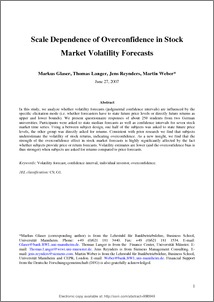|
Scale Dependence of Overconfidence in Stock Market Volatility Forecasts
Glaser, Markus
;
Langer, Thomas
;
Reynders, Jens
;
Weber, Martin
![[img]](https://madoc.bib.uni-mannheim.de/style/images/fileicons/application_pdf.png)  Vorschau |
|
PDF
SSRN_ID996849_code327099.pdf
- Veröffentlichte Version
Download (171kB)
|
|
URL:
|
http://ub-madoc.bib.uni-mannheim.de/1803
|
|
URN:
|
urn:nbn:de:bsz:180-madoc-18036
|
|
Dokumenttyp:
|
Arbeitspapier
|
|
Erscheinungsjahr:
|
2007
|
|
Titel einer Zeitschrift oder einer Reihe:
|
None
|
|
Sprache der Veröffentlichung:
|
Englisch
|
|
Einrichtung:
|
Fakultät für Betriebswirtschaftslehre > ABWL u. Finanzwirtschaft, insbes. Bankbetriebslehre (Weber 1993-2017)
|
|
MADOC-Schriftenreihe:
|
Lehrstuhl für ABWL, Finanzwirtschaft, insb. Bankbetriebslehre (Weber) > Working Papers
|
|
Fachgebiet:
|
330 Wirtschaft
|
|
Fachklassifikation:
|
JEL:
G1 C9 ,
|
|
Normierte Schlagwörter (SWD):
|
Preisänderung , Prognose , Konfidenzintervall , Investor , Selbstvertrauen
|
|
Freie Schlagwörter (Englisch):
|
Volatility forecast , confidence interval , individual investor , overconfidence
|
|
Abstract:
|
In this study, we analyze whether volatility forecasts (judgmental confidence intervals) are influenced by the specific elicitation mode (i.e. whether forecasters have to state future price levels or directly future returns as upper and lower bounds). We present questionnaire responses of about 250 students from two German universities. Participants were asked to state median forecasts as well as confidence intervals for seven stock market time series. Using a between subject design, one half of the subjects was asked to state future price levels, the other group was directly asked for returns. Consistent with prior research we find that subjects underestimate the volatility of stock returns, indicating overconfidence. As a new insight, we find that the strength of the overconfidence effect in stock market forecasts is highly significantly affected by the fact whether subjects provide price or return forecasts. Volatility estimates are lower (and the overconfidence bias is thus stronger) when subjects are asked for returns compared to price forecasts.
|
|
Zusätzliche Informationen:
|
Available at SSRN: http://ssrn.com/abstract
|
 | Das Dokument wird vom Publikationsserver der Universitätsbibliothek Mannheim bereitgestellt. |
 Suche Autoren in Suche Autoren in
BASE:
Glaser, Markus
;
Langer, Thomas
;
Reynders, Jens
;
Weber, Martin
Google Scholar:
Glaser, Markus
;
Langer, Thomas
;
Reynders, Jens
;
Weber, Martin
ORCID:
Glaser, Markus ; Langer, Thomas ; Reynders, Jens ; Weber, Martin  ORCID: 0000-0001-5018-3317 ORCID: 0000-0001-5018-3317
Sie haben einen Fehler gefunden? Teilen Sie uns Ihren Korrekturwunsch bitte hier mit: E-Mail
Actions (login required)
 |
Eintrag anzeigen |
|
|
 ORCID: 0000-0001-5018-3317
ORCID: 0000-0001-5018-3317



 Suche Autoren in
Suche Autoren in